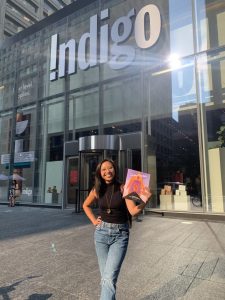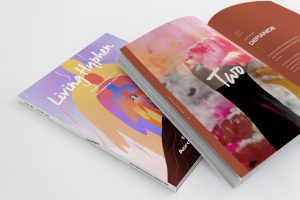Resistance in stories of survival, defiance and triumphs
Resistance in stories of survival, defiance and triumphs

The latest issue of Living Hyphen is now available at Indigo
Living Hyphen, Issue 2
By Irish Mae Silvestre
The Philippine Reporter
It’s been three years since the first issue of Living Hyphen and a lot has changed for its editor and founder Justine Abigail Yu. A compilation of stories and art exploring the meaning of a hyphenated identity, the magazine has certainly made waves: in addition to a podcast, the first issue also provided the inspiration for a play titled ‘nowhen’ which was recently showcased with Canadian Stage at the High Park Amphitheatre. Now back with a second issue available at Chapters Indigo, Yu talks to The Philippine Reporter about “resistance” – the theme for the second issue – and what it truly means to be a hyphenated Canadian today.
Edited for brevity
Can you tell us about yourself?
I was born in Manila and moved to Scarborough when I was just four years old, but I still feel deeply connected to my homeland and my heritage. Living Hyphen was a way to explore the nuances and complexities of my hyphenated identity in community with Canadians of various ethnic backgrounds and cultures. We now facilitate cultural programming by way of writing workshops and storytelling nights and produce a podcast.
What’s the second issue about?
While all the work that Living Hyphen does is inherently political due to the nature of living in between cultures, Issue 2.1: Resistance Across Generations is about where we stand in our commitment to decolonizing and dismantling systems of oppression. This issue’s theme is ‘resistance’: our stories of survival, defiance, and triumphs as people from various racialized communities, as well as the legacies that our ancestors have left us and the legacies we hope to bestow upon our descendants.

The second issue of Living Hyphen.
(Photo credit Living Hyphen)
Tell us about ‘nowhen.’
Stories from our magazine have been adapted into a stage play called ‘nowhen’ with Canadian Stage at the High Park Amphitheatre. Created by Canadian Stage MFA Candidate Alison Wong, ‘nowhen’ invites guests to explore, and “let go of time, and revel in place” in an auditory and nature-based experience. Wong reached out to me last year after having read the first issue of the magazine with the interest of collaborating. We met up for a socially distanced coffee and brainstormed ways in which we could adapt the stories into a stage play as part of her thesis project, which later became ‘nowhen.’ I’m particularly excited about this because for nearly 40 years, Canadian Stage has put on Shakespeare in High Park every summer; this year, the programming is finally more inclusive. Living Hyphen is proud to contribute to this programming and put a spotlight on talented diverse artists.
How did COVID-19 affect the process of putting this volume together?
The pandemic has revealed to the masses the injustices and inequities our communities face. The disproportionate loss and harm that Black and Brown communities have had to face due to COVID-19. The police brutality against Black communities. The surge of anti-Asian hate crimes. The enduring Islamophobia and anti-Semitism. The abhorrent immigration detentions against the Latinx community. The continued colonization of Indigenous nations, lands, and culture. All of this shaped our approach in bringing this issue to life.
How have events like the grim discoveries at residential schools changed your perception of what it means to be a Filipina-Canadian?
I’ve been doing the difficult and uncomfortable work of decolonizing since starting Living Hyphen in 2018, but the deep inequities of the pandemic and the current events around the mass unmarked graves of residential schools, the murder of so many Black people in the hands of police, and the rise of anti-Asian hatred has really accelerated my (un)learning journey. It forced me to confront the evil of colonialism both here in Canada and in the Philippines and how my identities are actually colonial identities. To be “Filipina” is to be colonized, to be “Canadian” is also to be colonized. This has made my work in dismantling this system of oppression even more urgent and significant and it has shaken the pride I previously felt in holding these two identities. The events of the last year have really clarified for me where I stand, how I want to shape the world, and the legacy I want to leave behind.
Can you tell us about the podcast?
Produced and co-hosted by fellow Pinay, Trisha Gregorio, our first season “Homestuck” was inspired by the pandemic. We bridge parallels between this pandemic experience and the grander hyphenated experience. We’ve been asked to stay home, quarantine, and maintain a “social distance” from loved ones. We’ve been challenged to find creative ways to show our love from afar. But for those of us who are part of a diaspora or who’ve been displaced in some way – voluntarily or forced, here on this land or abroad – we know all too well all the gradients and textures of loving from afar.
Which stories stuck with you the most?
Every story has a special meaning to me. Wanda Taylor’s “The Generations Speak” is about her great grandfather six generations back who escaped slavery in the USA to fight along British lines in the War of 1812. There’s Kathryn Gwun-Yeen Lennon’s poem “Dragons Might Have Been Here” about the Chinese labourers who built our railway system. Caitlin Akiko Bergin’s essay “Yonsei” tells of the generations of Japanese-Canadians and what they endured on this land. And there’s Shaelynn Recollet’s “Stories as Inheritance and Connection to the Past and Future” that speaks of the importance of the storytelling tradition in Indigenous communities to preserve history, remember family, and connect with ourselves. This issue tells the stories of communities who’ve fundamentally shaped what we now know as Canada but that our colonial government has buried, and mainstream media largely fails to expose.
——————————–
Living Hyphen is available at Chapters Indigo and bookstores across Canada. To purchase online or listen to the podcast, visit livinghyphen.ca
Comments (0)